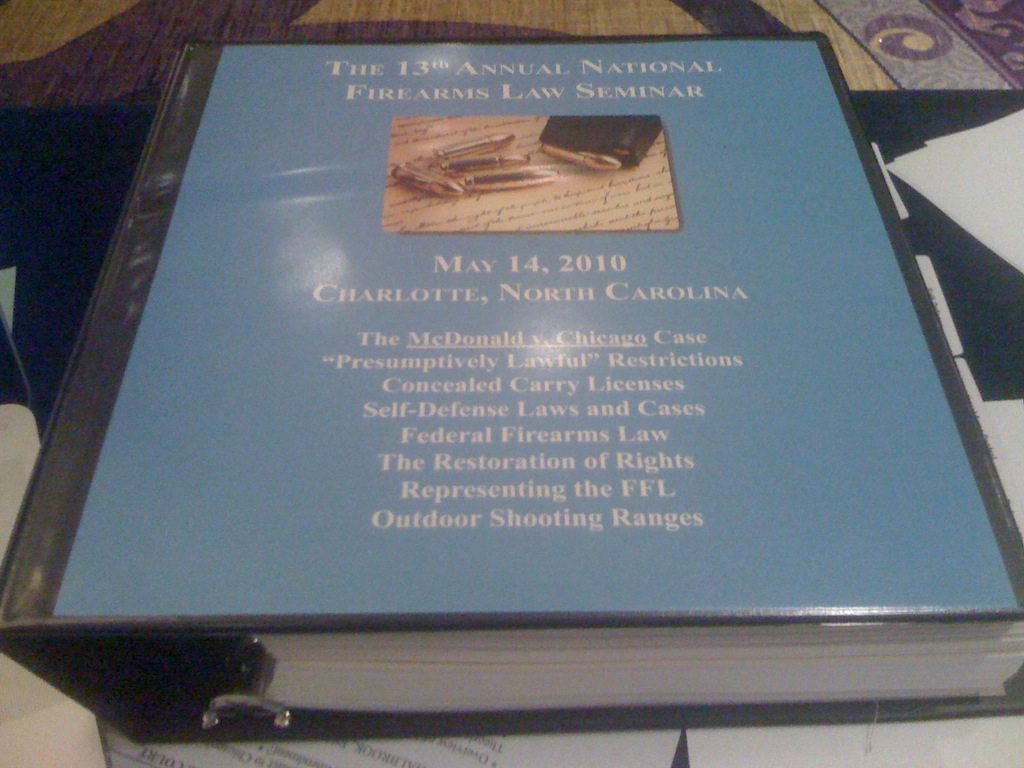For the past few days, we’ve been waiting to see the text of Senator Cornyn’s bill. It has not appeared yet at Thomas, but I managed to find it in the Congressional Record. It is not a short bill, but quite a lot of it is really just related to mental health, and has nothing to do with gun laws. I find the NRA’s statements about the bill to be credible. S.2002 would give us, for the first time since the Gun Control Act passed, a very precise definition of what it means to be “adjudicated.” The meat of the bill is here:
SEC. 302. DEFINITIONS RELATING TO MENTAL HEALTH. (a) Title 18 Definitions.--Chapter 44 of title 18, United States Code, is amended-- (1) in section 921(a), by adding at the end the following: ``(36)(A) Subject to subparagraph (B), the term `has been adjudicated mentally incompetent or has been committed to a psychiatric hospital', with respect to a person-- ``(i) means the person is the subject of an order or finding by a judicial officer, court, board, commission, or other adjudicative body-- ``(I) that was issued after-- ``(aa) a hearing-- ``(AA) of which the person received actual notice; and ``(BB) at which the person had an opportunity to participate with counsel; or ``(bb) the person knowingly and intelligently waived the opportunity for a hearing-- ``(AA) of which the person received actual notice; and ``(BB) at which the person would have had an opportunity to participate with counsel; and ``(II) that found that the person, as a result of marked subnormal intelligence, mental impairment, mental illness, incompetency, condition, or disease-- ``(aa) was a danger to himself or herself or to others; ``(bb) was guilty but mentally ill in a criminal case, in a jurisdiction that provides for such a verdict; ``(cc) was not guilty in a criminal case by reason of insanity or mental disease or defect; ``(dd) was incompetent to stand trial in a criminal case; ``(ee) was not guilty by reason of lack of mental responsibility under section 850a of title 10 (article 50a of the Uniform Code of Military Justice); ``(ff) required involuntary inpatient treatment by a psychiatric hospital for any reason, including substance abuse; or ``(gg) required involuntary outpatient treatment by a psychiatric hospital based on a finding that the person is a danger to himself or herself or to others; and ``(ii) does not include-- ``(I) an admission to a psychiatric hospital for observation; or ``(II) a voluntary admission to a psychiatric hospital. ``(B) In this paragraph, the term `order or finding' does not include-- ``(i) an order or finding that has expired or has been set aside or expunged; ``(ii) an order or finding that is no longer applicable because a judicial officer, court, board, commission, or other adjudicative body has found that the person who is the subject of the order or finding-- ``(I) does not present a danger to himself or herself or to others; ``(II) has been restored to sanity or cured of mental disease or defect; ``(III) has been restored to competency; or ``(IV) no longer requires involuntary inpatient or outpatient treatment by a psychiatric hospital; or ``(iii) an order or finding with respect to which the person who is subject to the order or finding has been granted relief from disabilities under section 925(c), under a program described in section 101(c)(2)(A) or 105 of the NICS Improvement Amendments Act of 2007 (18 U.S.C. 922 note), or under any other State-authorized relief from disabilities program of the State in which the original commitment or adjudication occurred. ``(37) The term `psychiatric hospital' includes a mental health facility, a mental hospital, a sanitarium, a psychiatric facility, and any other facility that provides diagnoses or treatment by licensed professionals of mental retardation or mental illness, including a psychiatric ward in a general hospital.''; and (2) in section 922-- (A) in subsection (d)(4)-- (i) by striking ``as a mental defective'' and inserting ``mentally incompetent''; and (ii) by striking ``any mental institution'' and inserting ``a psychiatric hospital''; and (B) in subsection (g)(4)-- (i) by striking ``as a mental defective or who has'' and inserting ``mentally incompetent or has''; and (ii) by striking ``mental institution'' and inserting ``psychiatric hospital''. (b) Technical and Conforming Amendment.--The NICS Improvement Amendments Act of 2007 (18 U.S.C. 922 note) is amended-- (1) by striking ``as a mental defective'' each place that term appears and inserting ``mentally incompetent''; (2) by striking ``mental institution'' each place that term appears and inserting ``psychiatric hospital''; (3) in section 101(c)-- (A) in paragraph (1), in the matter preceding subparagraph (A), by striking ``to the mental health of a person'' and inserting ``to whether a person is mentally incompetent''; and (B) in paragraph (2)-- (i) in subparagraph (A)(i), by striking ``to the mental health of a person'' and inserting ``to whether a person is mentally incompetent''; and (ii) in subparagraph (B), by striking ``to the mental health of a person'' and inserting ``to whether a person is mentally incompetent''; and (4) in section 102(c)(3)-- (A) in the paragraph heading, by striking ``as a mental defective or committed to a mental institution'' and inserting ``mentally incompetent or committed to a psychiatric hospital''; and (B) by striking ``mental institutions'' and inserting ``psychiatric hospitals''.
Someone had asked me earlier if this would fix the problem with observational commitments under Section 302 of Pennsylvania’s Mental Health Procedures Act. The answer is yes, for federal purposes. But 302 observational commitments are still disabling under Pennsylvania law. California has a similar observational commitment called a 5150, and again, this won’t count as a disability under federal law anymore, but California still bars people who have 5150 commitments from possessing firearms for 5 years. This is the same under Florida’s Baker Act as well.
But what about the veterans who have already been put into the system? Under the NICS Improvement Amendment Act of 2007, veterans could petition to have themselves removed from the system. The act requires that the Attorney General provide written notice to every person with a record in the system for mental health disabilities, and informing them of their right to petition to have themselves removed:
SEC. 304. PROTECTING THE SECOND AMENDMENT RIGHTS OF VETERANS. (a) In General.--Chapter 55 of title 38, United States Code, is amended by adding at the end the following: ``Sec. 5511. Conditions for treatment of certain persons as adjudicated mentally incompetent for certain purposes ``(a) Protecting Rights of Veterans With Existing Records.--Not later than 90 days after the date of enactment of the Mental Health and Safe Communities Act of 2015, the Secretary shall provide written notice in accordance with subsection (b) of the opportunity for administrative review under subsection (c) to all persons who, on the date of enactment of the Mental Health and Safe Communities Act of 2015, are considered to have been adjudicated mentally incompetent or committed to a psychiatric hospital under subsection (d)(4) or (g)(4) of section 922 of title 18 as a result of having been found by the Department to be mentally incompetent. ``(b) Notice.--The Secretary shall provide notice under this section to a person described in subsection (a) that notifies the person of-- ``(1) the determination made by the Secretary; ``(2) a description of the implications of being considered to have been adjudicated mentally incompetent or committed to a psychiatric hospital under subsection (d)(4) or (g)(4) of section 922 of title 18; and ``(3) the right of the person to request a review under subsection (c)(1). ``(c) Administrative Review.-- ``(1) Request.--Not later than 30 days after the date on which a person described in subsection (a) receives notice in accordance with subsection (b), such person may request a review by the board designed or established under paragraph (2) or by a court of competent jurisdiction to assess whether the person is a danger to himself or herself or to others. In such assessment, the board may consider the person's honorable discharge or decorations. ``(2) Board.--Not later than 180 days after the date of enactment of the Mental Health and Safe Communities Act of 2015, the Secretary shall designate or establish a board that shall, upon request of a person under paragraph (1), assess whether the person is a danger to himself or herself or to others. ``(d) Judicial Review.--A person may file a petition with a Federal court of competent jurisdiction for judicial review of an assessment of the person under subsection (c) by the board designated or established under subsection (c)(2).''.
Not quite as good as simple removing all the records the VA placed in their entirety, but I suspect there was some concern some of those people might legitimately belong in there, and separating the wheat from the chaff would be too tall an order.
Overall this bill would be an improvement over the current status quo, since it offers a good bit more precision. So far only NAGR has come out against the bill, which is not surprising. So far GOA has been silent on S.2002 as far as I’ve seen, even though they vociferously opposed NIAA in 2007, which was also a major easement of the mental health provisions of the Gun Control Act. Perhaps GOA is waiting to see language, or will just remain silent about the bill. This bill really is an improvement. There are always going to be folks out there who will be satisfied with nothing less than total repeal of the Gun Control Act, and I don’t blame them. But guns for crazy people isn’t a hill I’m looking to die on.





